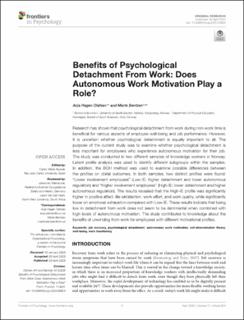| dc.contributor.author | Olafsen, Anja Hagen | |
| dc.contributor.author | Bentzen, Marte | |
| dc.date.accessioned | 2020-05-04T10:46:12Z | |
| dc.date.available | 2020-05-04T10:46:12Z | |
| dc.date.created | 2020-05-01T07:48:40Z | |
| dc.date.issued | 2020 | |
| dc.identifier.citation | Frontiers in Psychology. 2020. | en_US |
| dc.identifier.issn | 1664-1078 | |
| dc.identifier.uri | https://hdl.handle.net/11250/2653185 | |
| dc.description | This is an open-access article distributed under the terms of the Creative Commons Attribution License (CC BY). The use, distribution or reproduction in other forums is permitted, provided the original author(s) and the copyright owner(s) are credited and that the original publication in this journal is cited, in accordance with accepted academic practice. No use, distribution or reproduction is permitted which does not comply with these terms. | en_US |
| dc.description.abstract | Research has shown that psychological detachment from work during non-work time is beneficial for various aspects of employee well-being and job performance. However, it is uncertain whether psychological detachment is equally important to all. The purpose of the current study was to examine whether psychological detachment is less important for employees who experience autonomous motivation for their job. The study was conducted in two different samples of knowledge workers in Norway. Latent profile analysis was used to identify different subgroups within the samples. In addition, the BCH method was used to examine possible differences between the profiles on distal outcomes. In both samples, two distinct profiles were found: “Lower involvement employees” (Low-IE; higher detachment and lower autonomous regulation) and “Higher involvement employees” (High-IE; lower detachment and higher autonomous regulation). The results revealed that the High-IE profile was significantly higher in positive affect, life satisfaction, work effort, and work quality, while significantly lower on emotional exhaustion compared with Low-IE. These results indicate that being low in detachment from work does not seem to be detrimental when combined with high levels of autonomous motivation. The study contributes to knowledge about the benefits of unwinding from work for employees with different motivational profiles. | en_US |
| dc.language.iso | eng | en_US |
| dc.rights | Navngivelse 4.0 Internasjonal | * |
| dc.rights.uri | http://creativecommons.org/licenses/by/4.0/deed.no | * |
| dc.title | Benefits of Psychological Detachment from Work: Does Autonomous Work Motivation Play a Role? | en_US |
| dc.type | Peer reviewed | en_US |
| dc.type | Journal article | en_US |
| dc.description.version | publishedVersion | en_US |
| dc.rights.holder | © 2020 Olafsen and Bentzen | en_US |
| dc.source.journal | Frontiers in Psychology | en_US |
| dc.identifier.doi | https://doi.org/10.3389/fpsyg.2020.00824 | |
| dc.identifier.cristin | 1808986 | |
| cristin.ispublished | true | |
| cristin.fulltext | original | |
| cristin.qualitycode | 2 | |

